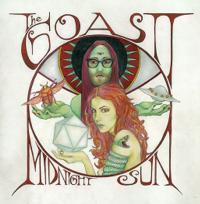For a 38-year-old who has existed in a bubble of music his entire life (an increasingly eclectic one as the years have gone by, at that), Sean Lennon does not have a huge amount of work to his name. Ever since his solo debut, Into The Sun (1998), an album that received more than its share of unfair criticism, he has seemed wary of expressing himself, as one would be in what must be his confusing, claustrophobic (but incredibly expensive) shoes. Therefore between then and his follow-up, Friendly Fire (2006), his mission was to "experience music anonymously", and this he did by performing in Cibo Matto and working with artists from The Strokes to Jurassic 5.
Those experiences have moulded him into an artist of intriguing sensibility, however much you might say that anyone can eventually come up with something good if your circumstances allow you pretty much unimpaired access to high-end studios since childhood. And that reluctance to release has been quashed: thanks in part, surely, to the inspiring influence of his Ghost Of A Saber Tooth Tiger bandmate and long-term partner, Charlotte Kemp Muhl.
This second album from TGOASTT is more focused than the charming but erratic Into The Sun, more fun than the beautiful but slightly maudlin Friendly Fire and more a realisation of the duo’s initial vision for the project than 2010’s chipper offering of minimalist folk, Acoustic Sessions. With its heavy slabs of unapologetic, clearly Tame Impala-influenced psychedelia, the sound is ambitious and on delicious tracks such as ‘Moth To A Flame’, often designed to illicit the same emotional response as the most garish prog. Yet Lennon and Kemp Muhl’s songwriting remains generally first-rate throughout, their voices twining beautifully and effortlessly (his, slightly less nasal and more boyish than his Great Shadow), while the fairytale whimsy in their lyrics that teetered on irritating on Acoustic Sessions has been mostly jettisoned in favour of subtle, and not always entirely successful, musings on the great nightmarish experience that is first-world existence in 2014.
The album delivers gold across its first three tracks; ‘Too Deep’, ‘Xanadu’ and ‘Animals’ are viscerally satisfying, high-octane psych anthems, with an attractive sense of humour. ‘Xanadu’, with its glam-influenced flamboyance is by far the album’s catchiest song, though ‘Animals’ trumps it for mood, momentum and climax.
Though subtleties weave themselves through the instrumentation and assortment of effects employed on Midnight Sun, the songs themselves are uncomplicated – in the music he writes, Lennon has long opted for simplicity, security and symmetry in melody, however derivative, over sophistication and innovation (though granted, that is hardly the case with Mystical Weapons, his improvisatory project with Deerhoof’s Greg Saunier). So the big choruses and undemanding hooks continue on ‘Great Expectations’ and the brilliant ‘Devil You Know’, where Kemp Muhl in particular shines before Lennon’s low rumble adorns the chorus. The song is the most satisfying example of their partnership yet.
Kemp Muhl has, reportedly, had a significant influence on Lennon’s lyrics, as well as acting as a playmate with whom he can wilfully explore dreams and revisit childhood – surely TGOASTT’s greatest inspiration, despite the often more sinister subject matter here (‘Moth To A Flame’ especially) compared with Acoustic Sessions. Aside from her poetic contribution and unspectacular but atmospheric voice, her capacity to draw such enthusiasm and focus from the often-mercurial Lennon is chief among her gifts.
It is a shame then that Midnight Sun‘s only unquestionable misstep is that with Kemp Muhl’s most notable vocal, the ridiculous ‘Johannesburg’, a forced, hackneyed and twee cut that stands out horribly amid the weightier sounds around it, and recalls Acoustic Sessions with the pair endeavouring to "talk politics with trees". Another possible track too far might be the cover of Gandalf’s ‘Golden Earrings’, Gandalf’s version itself being not theirs (an Evans-Livingston composition with Victor Young). Again, the pair’s cumbersome, uninteresting passage through a mediocre song is incongruous next to the buoyancy of their own compositions, and ultimately the track serves no function other than making it clear that Lennon’s tastes lie on the more obscure side of 60s psychedelia rather than oh, say, The Beatles.
Lennon met Kemp Muhl in 2006: two albums in eight years for TGOASTT is about right for his rate of return. However, one gets the impression that music is just one means of expressing what, to the outsider’s eye, looks like a profound personal connection, making this album even for the cynical, an endearing, lovingly crafted thing, even for all its flaws. It is not pretentious and it is not pompous – here is an ingenuous album made by a couple of odd cherubs who just happen to be, inescapably, two of the Beautiful People.


